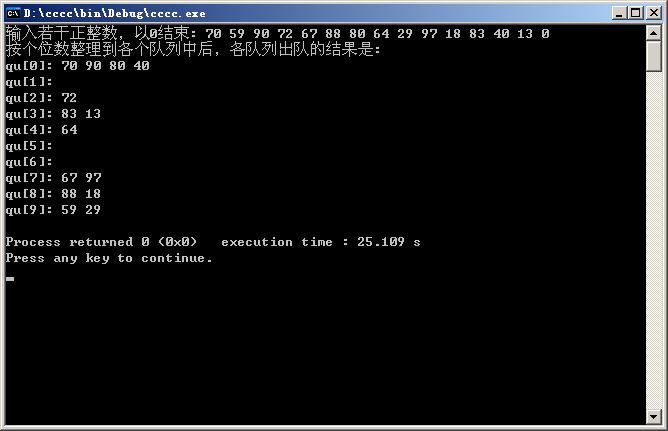/* *Copyright(c)2017, School of computer science, Yantai University *All right reserved. *File name: main.cpp sqqueue.h sqqueue.cpp *Author: Huang Shisheng *Completion date: October 20, 2017 *Version number: v1.0 * *Problem Description: see Item 4 - queue array *Input Description: input 70 59 90 72 67 88 80 64 29 97 18 83 40 13 0 *Program output: see screenshot of operation result */
Main function:
#include <stdio.h> #include<malloc.h> #include"../liqueue.h" #define N 10 int main() { int i,a; LiQueue *qu[N];//Define queue pointer array for(i=0;i<N;i++) InitQueue(qu[i]); //Add values to the queue printf("Enter positive integers, ending with 0: "); scanf("%d", &a); while(a) { enQueue(qu[a%10], a); scanf("%d", &a); } //Output each queue printf("After sorting by single digit into each queue, the result of each queue is: \n"); for(i=0;i<N;i++) { printf("qu[%d]: ",i); while(!QueueEmpty(qu[i])) { deQueue(qu[i], a); printf("%d ",a); } printf("\n"); } for(i=0;i<N;i++) DestroyQueue(qu[i]); return 0; }
liqueue.cpp Code:
liqueue.h Code:#include"liqueue.h" #include<stdio.h> #include<malloc.h> void InitQueue(LiQueue *&q) //Initialize chain team { q=(LiQueue *)malloc(sizeof(LiQueue)); q->front=q->rear=NULL; } void DestroyQueue(LiQueue *&q) //Destruction chain { QNode *p=q->front,*r; if(p!=NULL) { r=p->next; while(r!=NULL) { free (p); p=r; r=p->next; } } free(p); free(q); } bool QueueEmpty(LiQueue *q) //Judge whether the chain team is empty { return(q->rear==NULL); } int QueueLength(LiQueue *q) //Return the number of data elements in the queue { int n=0; QNode *p=q->front; while(p!=NULL) { n++; p=p->next; } return (n); } void enQueue(LiQueue *&q,ElemType e) //Join the team { QNode *p; p=(QNode *)malloc(sizeof (QNode)); p->data=e; p->next=NULL; if(q->rear==NULL) q->front=q->rear=p; else { q->rear->next=p; q->rear=p; } } bool deQueue(LiQueue *&q,ElemType &e) //Team out { QNode *t; if(q->rear==NULL) return false; t=q->front; if(q->front==q->rear) q->front=q->rear=NULL; else q->front=q->front->next; e=t->data; free(t); return true; }
typedef int ElemType; typedef struct qnode { ElemType data; struct qnode *next; } QNode; //Chain data node type definition typedef struct { QNode *front; QNode *rear; } LiQueue; //Chain team type definition void InitQueue(LiQueue *&q); //Initialize chain team void DestroyQueue(LiQueue *&q); //Destruction chain bool QueueEmpty(LiQueue *q); //Judge whether the chain team is empty int QueueLength(LiQueue *q); //Return the number of data elements in the queue void enQueue(LiQueue *&q,ElemType e); //Join the team bool deQueue(LiQueue *&q,ElemType &e); //Team out
Screenshot of operation result:

Learn new:
Through this project, I learned how to use the queue array to complete the data queue. Using the queue array, I actually need to store the pointers of ten queues in one array.
Published 34 original articles·
Zan Zan 9.
10000 visitors+

